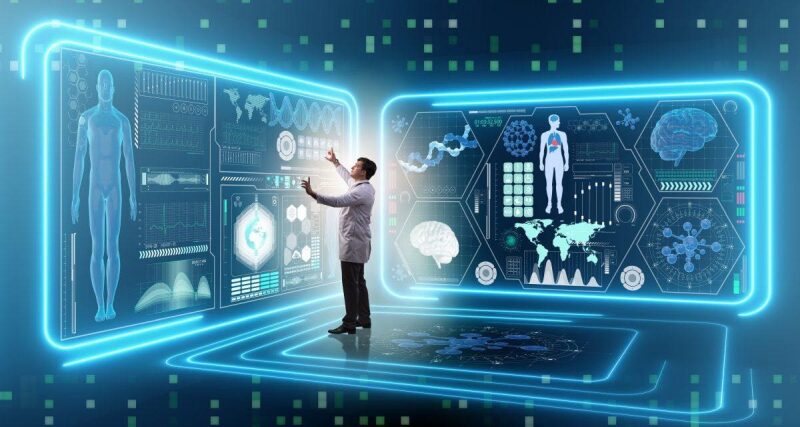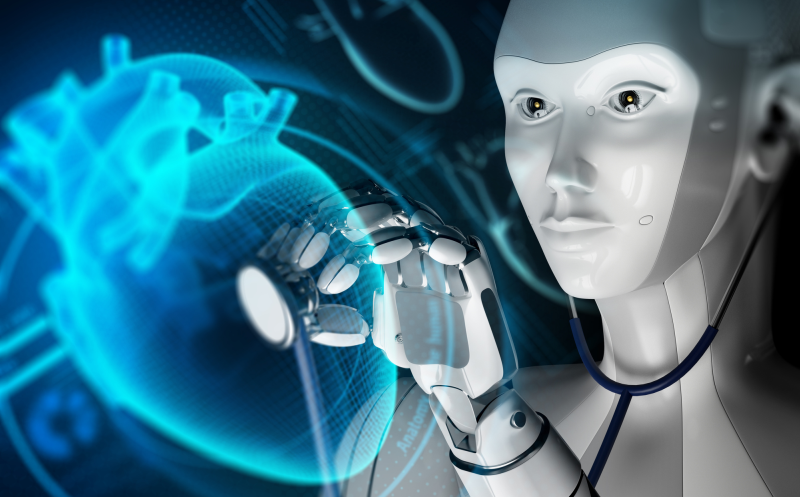The intersection of Artificial Intelligence (AI) and healthcare has, for many, represented the frontiers of technology and human well-being. Why is this union significant? For starters, AI offers the potential to revolutionize the manner in which medical professionals diagnose and treat diseases, manage patient data, and research groundbreaking treatments. But, like any evolving relationship, this synergy is not without its fair share of trials. So, what opportunities does AI bring to the healthcare table? And what are the challenges that might deter its full integration? Let’s dive in.
Opportunities Galore: AI’s Potential in Healthcare

Source: forbes.com
Throughout the historical evolution of healthcare practices, spanning centuries and reflecting advancements in medical knowledge and technology, traditional methods of diagnosing diseases have been predominantly reliant on manual processes. These manual methods, essential for the progress of medicine, often require meticulous analysis and interpretation by skilled healthcare professionals. However, due to the inherent intricacies and time-consuming nature of these manual processes, instances of potential delays in providing accurate diagnoses and even misdiagnosis have been observed.
Despite these challenges, the advent of Artificial Intelligence (AI) has unquestionably reshaped the landscape of disease diagnosis. Enabled by its remarkable deep learning capabilities, AI swiftly and accurately evaluates thousands of medical images, offering numerous benefits in the field of diagnostics. With increased efficiency and precision, AI reduces the burden on healthcare professionals, enabling them to focus on critical decision-making tasks. Moreover, AI’s ability to analyze various types of medical images, including X-rays, CT scans, MRIs, and histopathological slides, allows for a comprehensive approach to disease detection and characterization.
By providing evidence-based recommendations, AI can assist healthcare professionals in making informed decisions and improve the overall quality of patient care. However, the integration of AI in disease diagnosis also brings forth ethical considerations and the importance of human oversight, ensuring a balanced and responsible implementation of this technology in healthcare settings.
Personalized Treatment Plans
Each patient’s body is unique. As such, treatments should be, too. AI can assist in tailoring treatment protocols based on the patient’s genetics, health history, and other critical factors. This level of personalization ensures more efficient care and can greatly increase recovery rates.
Efficient Drug Discovery
Traditional drug discovery methods can be laborious and costly. By analyzing vast amounts of data and conducting countless simulations, AI can help identify potential drug compounds quickly, drastically reducing the time and money spent on research and trials.
The Challenges Ahead: Navigating AI’s Complex Landscape

Source: theregreview.org
Data Privacy Concerns
With AI’s capability to analyze vast amounts of personal health data comes the inevitable concern about data privacy. How can we ensure that a patient’s data remains secure? While there are tools available, such as learning how to change your ip address on android to protect one’s online presence, there’s still a lot to be done in ensuring that medical data remains invulnerable to cyberattacks.
Over-reliance on Technology
As AI systems become more integrated in the medical field, there is an underlying fear that healthcare professionals may excessively depend on technology, leading to a possible neglect of their own clinical judgment. It is essential to recognize that while machines are capable of error, human oversight remains a vital component of any medical procedure. This recognition is vital for maintaining a balance between technological advancements and ensuring the best quality of care for patients.
As AI systems continue to become increasingly integrated into various domains of the medical field, including diagnosis, treatment planning, and patient management, there is a growing apprehension among healthcare professionals regarding the potential consequences of relying too heavily on technology. This concern stems from the fact that while AI can greatly enhance efficiency and accuracy, it cannot completely replace the expertise and critical thinking abilities of medical professionals.
Cost Implications
Implementing AI-driven tools and systems can be a significant financial investment for healthcare institutions operating on tight budgets. The upfront costs associated with procuring the necessary hardware, software, and expert consultation can be daunting, considering the limited financial resources available. However, not adopting AI technology could have serious consequences for healthcare institutions, as it has the potential to improve patient outcomes, optimize operational efficiency, and enable more accurate diagnoses and treatments. Therefore, despite the initial cost challenges, the healthcare institutions should carefully consider the long-term benefits and potential return on investment that implementing AI technology could bring.
Patient Acceptance and Trust

Source: readwrite.com
In the era of AI-driven healthcare, the acceptance and trust of patients in these advanced systems become paramount. As AI becomes more intertwined with patient care, healthcare providers face the task of not only deploying these technologies but also serving as mediators between the machine’s logic and human emotion. To foster trust, providers must transparently educate patients on how AI aids in their diagnosis or treatment, clearly explaining the benefits and addressing any potential concerns.
This education should demystify the technology, presenting it as a tool for enhancing human expertise rather than replacing it. Trust is further solidified when patients witness AI’s contributions to improved outcomes. The onus lies on healthcare professionals to bridge the gap between AI capabilities and patient confidence, ensuring that the introduction of AI into patient care is met with understanding and acceptance.
Continuous Learning and Adaptation

Source: mobihealthnews.com
The landscape of medicine is perpetually evolving, with new discoveries and shifting patient demographics. For AI systems to remain relevant and effective in healthcare practice, they must be designed for continuous learning and adaptation. AI must be updated with the latest medical research and data trends to reflect the current state of medical knowledge accurately. Additionally, it must adapt to the changing tapestry of patient populations, including diverse genetic, lifestyle, and environmental factors affecting health.
Only through ongoing learning can AI sustain its promise of precision and personalization in healthcare, staying abreast of the advancements in medicine to serve patients effectively. This commitment to adaptation ensures AI is a durable, reliable partner in healthcare delivery.
Conclusion
The dance between AI and healthcare is intricate. On the one hand, AI promises a future where diseases are detected early, treatments are personalized, and drugs are discovered efficiently. But on the other, there are very real challenges to navigate, from data privacy concerns to potential over-reliance on technology.
Yet, one thing is clear: The opportunities AI offers are too promising to ignore. By understanding and addressing its challenges head-on, we can hopefully harness AI’s full potential in healthcare, ensuring a brighter, healthier future for all.
Does this union promise a seamless melding of machine and medicine? Not immediately. But with the right approach, the challenges can become mere stepping stones to a revolution in healthcare that benefits both practitioners and patients.


















